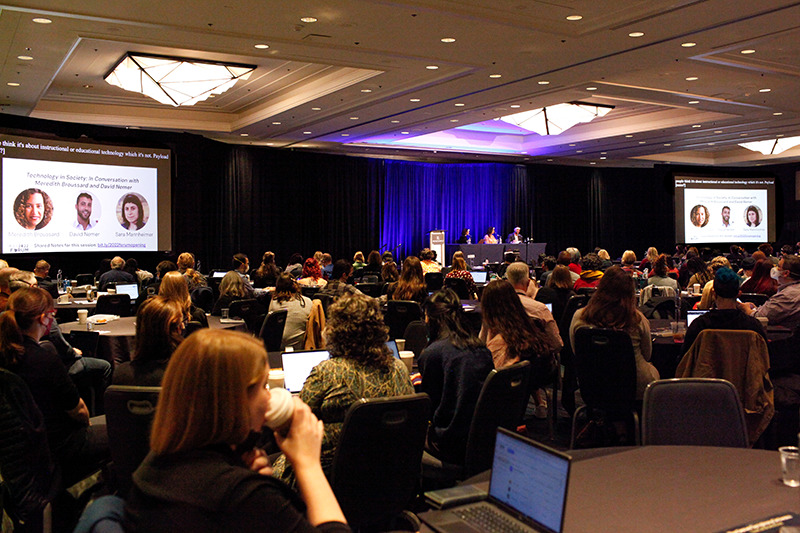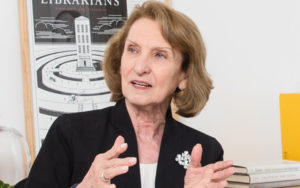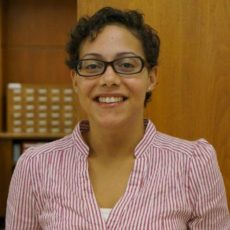Nearly 600 people gathered in Baltimore October 9-13 to participate in the 2022 CLIR events—Learn@DLF, DLF Forum, NDSA’s Digital Preservation, and Digitizing Hidden Collections Symposium. This suite of events was the first to be held in person since 2019.

The event series kicked off on Oct. 9 with Learn@DLF, a day devoted to workshops where attendees gain experience with new tools and resources, exchange ideas, and develop and share expertise with fellow community members. Workshop offerings ran the gamut, from using Fedora 6.0 and creating digital editions with FairCopy, to photogrammetry 3D modeling and personal archiving.
The 2022 DLF Forum opened the following morning with a plenary and keynote discussion hosted by DLF Data and Digital Scholarship Working Group co-convener Sara Mannheimer, in conversation with data journalist Meredith Broussard and anthropologist and media scholar David Nemer. Discussion focused on how technology affects society: Who creates technology, who is it designed for, who uses it, and how does it benefit society? The discussants explored how technology can perpetuate bias and inequality, and how GLAM practitioners can support reasonable technology use in their daily work.
Following the plenary, participants attended more than 40 panels and working group sessions, and numerous informal social events. In addition, three of the 2022 Forum Fellows presented their work in a lightning talk session. The Forum’s closing plenary featured a keynote by Andrew Coy, executive director of the Digital Harbor Foundation, who discussed lessons learned from his work in Baltimore and beyond to build digital equity opportunities and points of access.
After the Forum finished on Oct. 12, Digital Preservation 2022: Preserving Legacy kicked off with an opening plenary and a keynote by Dorothy Berry. Berry, a digital curator at the Smithsonian National Museum of African History and Culture, explored the complexities of digital preservation in the creative organization of history storytelling. Panels, lightning talks, and a poster session followed, concluding at noon the next day.
Digitizing Hidden Collections also held the opening plenary for its symposium the afternoon of Oct. 12, with a presentation by scholar, writer, and archivist Michelle Caswell, who challenged participants to facilitate new ways to activate digital collections, reaching beyond campus-based students and researchers to motivate and inspire activists and organizers advocating for social change. The following day, recipients of Digitizing Hidden Collections awards shared lessons from their project work and talked about “what’s next.”
Most of the event sessions were documented with community notes. Blogs featuring reflections by Forum Fellows will be posted from Nov. 8–Dec. 9 at https://www.diglib.org/category/forum-fellows/. Links to the keynotes will be available later this year.
Mark your calendars now for the 2023 DLF Forum, Learn@DLF workshops, and NDSA’s Digital Preservation, to be held November 12-16 in St. Louis, Missouri! Sign up for the DLF Forum newsletter to be among the first to hear news about the Forum and affiliated events.
Editor’s note: In this edition, we talk with Rina Pantalony, chair, and Melissa Levine, vice chair, of the recently formed Open Copyright Education Advisory Network (OCEAN). OCEAN is a volunteer coalition of people committed to helping those who work in museums, libraries, and archives better understand copyright and develop relevant strategies for working with it.
Led by a distinguished advisory board and faculty with deep practical and theoretical experience with copyright, OCEAN conducts education and facilitates discussion around complex issues of copyright. This fall they are conducting five free discussion sessions on current topics in copyright, and a workshop co-produced with the American Alliance of Museum on Managing Copyright Issues From Acquisition to Exhibition.
Rina Pantalony is also director of Copyright Advisory Services at Columbia University Libraries. Melissa Levine is director of the Library Copyright Office at the University of Michigan.
What prompted the formation of OCEAN?
Copyright and related issues are foundational to our networked, digital world. The pandemic, especially, highlighted the pervasive, persistent need for guidance in day-to-day and strategic decisions. When copyright determinations are made in a responsible manner, it both lowers risk and ensures sustained ongoing access. We aim to address points of convergence across museums, libraries, archives, education—the cultural heritage community broadly. OCEAN’s advisory committee and faculty have decades of experience in these areas and have had the opportunity to get extensive feedback from our communities. By expanding the audience to include all members of the cultural heritage community, we have strength in scale, skill, and sustainability. We are committed to this kind of empowering education that supports stewardship and thoughtful, mission-aligned decision-making.
We are grateful for the support over several years from the Alfred P. Sloan Foundation, LYRASIS, and Ithaka S+R. We look forward to collaborating with CLIR to promote a holistic approach and shared vision to achieve scale and drive progress in cultural heritage practices and beyond.
At your 2022 DLF Forum presentation, you said that how you teach and communicate must be accessible and equitable. Can you say more about that?
Copyright and related matters like contracts and ethics are embedded in the stewardship of collections, regardless of format. The issues are globally relevant. We are fortunate to have tools like Zoom that allow us to engage in open, free discussions about the legal concepts, policy choices, and decision-making by and for practitioners in libraries, archives, and museums everywhere.
The faculty for our discussions represent a range of positions and institutions—from Carla Myers at Miami University Libraries to Margaret McKee from the Menil Collection and Anne Young, who edited the Rights and Reproductions handbook. Sandra Enmil from Yale and Anne Gilliand from UNC recently joined us. We are committed to having experienced people from all of the cultural heritage organizations, because the copyright concepts are the same. However, the fact scenarios and approaches to issues can differ in ways that make it helpful to center different experiences. The discussion sessions are available at no charge. In most cases, we are not recording sessions to encourage open discussions and questions.
What are your plans for OCEAN going forward?
First and foremost, we hope to develop a community of practice by providing reliable, accessible resources. We mean accessible not only in terms of addressing varied visual and aural needs, but also in terms of being easily available to anyone—that is, sharing adaptable, accurate information vetted by expert practitioners with both legal and practical expertise in cultural heritage work. Ultimately, we would love these resources to be available in several languages.
We are also thinking about tailored consulting services to help organizations look at options and make informed decisions. We would not be offering legal advice, but would instead be looking at practical aspects of copyright and collections management—contracts, ethics, permissions, international questions, cultural knowledge. Perhaps we would work with nonprofits and foundations to align their practices in this space.
Of course, we want to continue offering our Discussion Series. The response has been tremendous. We typically have a few hundred registrants for every session, and most of them attend. We have a low attrition rate with a remarkable level of participation. The number of questions posted in the chat speaks to active engagement.
In 2023, the Leading Change Institute (LCI) will take a hiatus as CLIR and EDUCAUSE substantively assess the program, with the aim of launching an updated one in summer 2024. As in 2010, when an earlier program refresh saw the Frye Leadership Institute evolve into the Leading Change Institute, we will extensively consult with program alumni and leaders in the field of higher education throughout the process, so you can expect to be hearing from us again during the coming year.
If you are interested in attending or sending a staff member to a future Institute, we encourage you to sign up for our mailing list to be informed of updates. We’ll also post news on our website. And if you have questions or feedback you’d like us to take into consideration, please reach out to Lizzi Albert at lalbert@clir.org.

Deanna Marcum, who passed away in August, touched the lives of many as a colleague, friend, mentor, visionary, and leader throughout her remarkable career. Deanna was CLIR’s first president and led its two predecessor organizations—the Council on Library Resources and the Commission on Preservation and Access—before their merger in 1997. At CLIR, we remember her life with admiration and gratitude, but mourn a profound loss.
We have created a tribute page to honor her memory, and as a place where colleagues and friends can share their remembrances. Additions are welcome and can be sent to Kathlin Smith at ksmith@clir.org.

Alyson Pope has been promoted to program officer, where she will be responsible primarily for CLIR’s Digitizing Hidden Collections and Recordings at Risk programs. Alyson joined the staff in early 2021 as grants and contracts manager.
“Alyson’s promotion to program officer reflects CLIR’s appreciation for the significant contributions she’s made across our organization, especially to our regranting programs, since joining our staff,” said CLIR chief operating officer Amy Lucko. “She is a remarkably able administrator and trusted colleague whose vision and empathy are evident in all aspects of her work. We’re so pleased she’s stepping into this important role to benefit our programs and the communities we serve.”
Supporting Software Preservation Services in Research and Memory Organizations: A White Paper from the Software Preservation Network’s Research-in-Practice Working Group. This white paper outlines findings from a survey- and interview-based study of software preservation service providers, including archivists, librarians, preservation specialists, technologists, and others. Results presented in the paper include a set of service provider personas, an overview of the conceptions of software that exist in research and memory organizations, a delineation of multilevel barriers to software preservation, and a related set of themes and targeted recommendations. Coming early November.
Amplifying Unheard Voices: Program Assessment Report. This report shares findings and recommendations from the assessment of “Amplifying Unheard Voices,” the first iteration of a major revision of CLIR’s Digitizing Hidden Special Collections and Archives grant program. The primary goal of the report was to help program staff, reviewers, and other stakeholders understand what is working in the revised program and to consider areas of program improvement. Beyond CLIR, the report will be of interest to funders working in the cultural heritage space, program managers working to construct equitable review processes, those seeking grant funding, or anyone designing a qualitative program assessment. Coming early 2023.
ISSN 1944-7639
Content is not copyrighted and can be freely distributed

Council on Library and Information Resources
1800 Diagonal Road, Suite 600
Alexandria, VA 22314
contact@clir.org
CLIR is an independent, nonprofit organization that forges strategies to enhance research, teaching, and learning environments in collaboration with libraries, cultural institutions, and communities of higher learning.
Unless otherwise indicated, content on this site is available for re-use under CC BY-SA 4.0 License